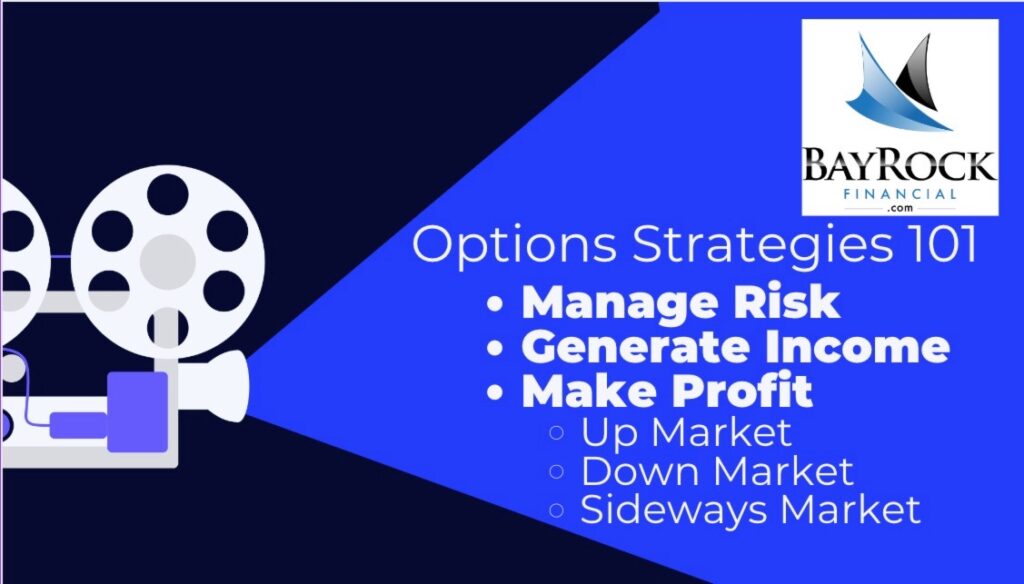Options Strategies 101
Basics of Options
Risk Management
Basic Option Trading Strategies
Real-World Examples
Common Mistakes
How to Avoid Them
Selecting the Best Securities
Options Strategies 101: How to Minimize Risk and Maximize Profit by CFP® Professional Jim Munchbach
Table of Contents
-
Introduction
-
Basics of Options Trading
-
Risk Management in Options Trading
-
Basic Option Trading Strategies
-
Real-World Examples
-
Common Mistakes and How to Avoid Them
-
Selecting the Best Securities for Options Trading
-
Conclusion
Introduction
Welcome to our introductory guide to Options Trading Strategies. This educational content is not intended to be investment advice.
The following content is for BayRock Clients, Prospective Clients, and DIY Investors.
We created this post to give you a better understanding of why we use Options Strategies to:
-
Manage Risk,
-
Generate Income, and
-
Profit Regardless of Market Direction.
Basics of Options Trading
1. Definition of Options
Options are financial instruments that give you the right but not the obligation to buy or sell an underlying asset at a predetermined price within a specific time frame.
2. Call vs Put Options
-
Call Options: Give you the right to buy.
-
Put Options: Give you the right to sell.
3. Why Choose Options Over Stocks?
-
Leverage: Control a large number of shares with a small investment.
-
Hedging: Protect your portfolio from downside risks.
-
Income Generation: Earn income through selling options.
Risk Management in Options Trading
1. The Importance of Risk Management
Risk management is critical in options trading to preserve capital and generate consistent returns.
2. Option Greeks (Delta, Gamma, Theta, Vega)
These are metrics that indicate how the price of an option changes in relation to various factors.
3. Position Sizing and Risk-Reward Ratio
Determining the right size for your trades and maintaining a favorable risk-reward ratio is crucial.
Basic Option Trading Strategies
1. Covered Call
-
Risk Level: Low
-
Suitable for: Income Generation
2. Protective Put
-
Risk Level: Low
-
Suitable for: Hedging
3. Iron Condor
-
Risk Level: Medium
-
Suitable for: Sideways Market
4. Straddles and Strangles
-
Risk Level: High
-
Suitable for: Volatile Market
5. Naked Put
-
Risk Level: High
-
Suitable for: Income Generation with High Risk
Real-World Examples
1. Covered Call Examples using SPY and TLT
Utilizing the SPY and TLT for covered calls can provide steady income.
2. Naked Put Examples using SPY and TLT
Naked puts can be profitable but come with higher risks.





Common Mistakes and How to Avoid Them
1. Overleveraging
Avoid putting all your capital into a single trade.
2. Ignoring the Greeks
Always consider the Option Greeks when assessing a trade.
3. Poor Risk Management
Implement solid risk management strategies to protect your investments.
4. Selecting the Wrong Security
Not all securities are suitable for every options strategy.
Selecting the Best Securities for Options Trading
Factors to Consider
1. Liquidity
High trading volume and open interest indicate better liquidity.
2. Bid-Ask Spread
A narrow spread is preferable for lower trading costs.
3. Costs and Fees
Watch out for commissions, contract fees, and exercise and assignment fees.
4. Volatility
Consider implied and historical volatility for your chosen strategy.
5. Underlying Asset
Opt for stocks, ETFs, or indices based on your strategy and risk tolerance.
Tips for DIY Investors
-
Start with a watchlist.
-
Test strategies with paper trading.
Conclusion
Options trading offers diverse strategies to manage risk, generate income, and capitalize on various market conditions. With proper understanding and risk management, it can be a very helpful addition to your investment portfolio.
For more personalized financial planning advice and investment management strategies, feel free to book a free consultation, click here now.





